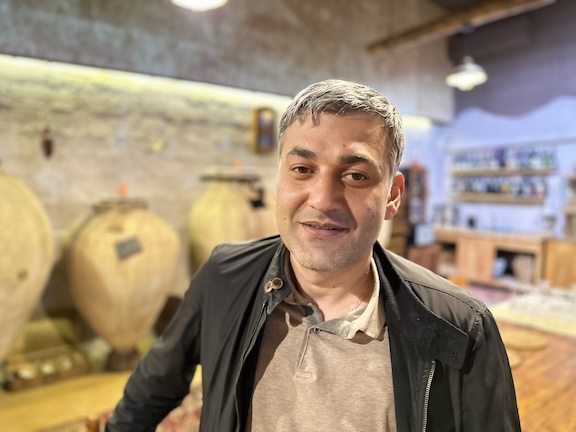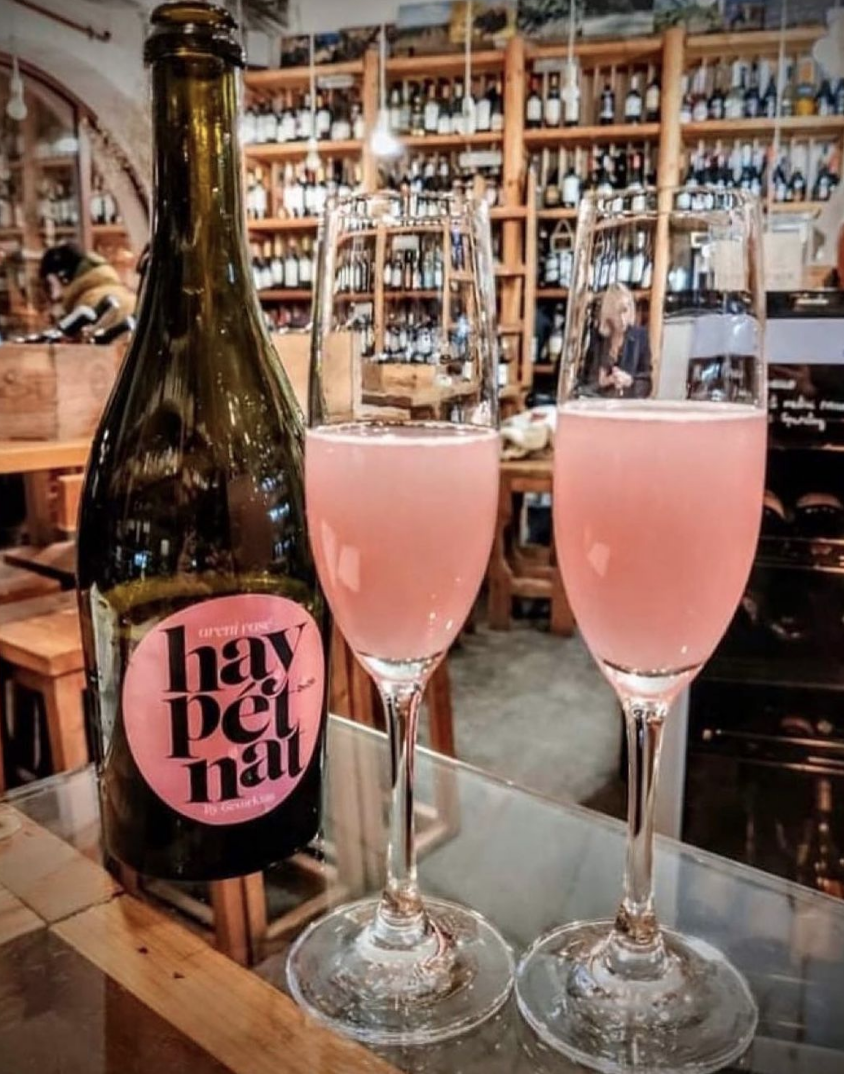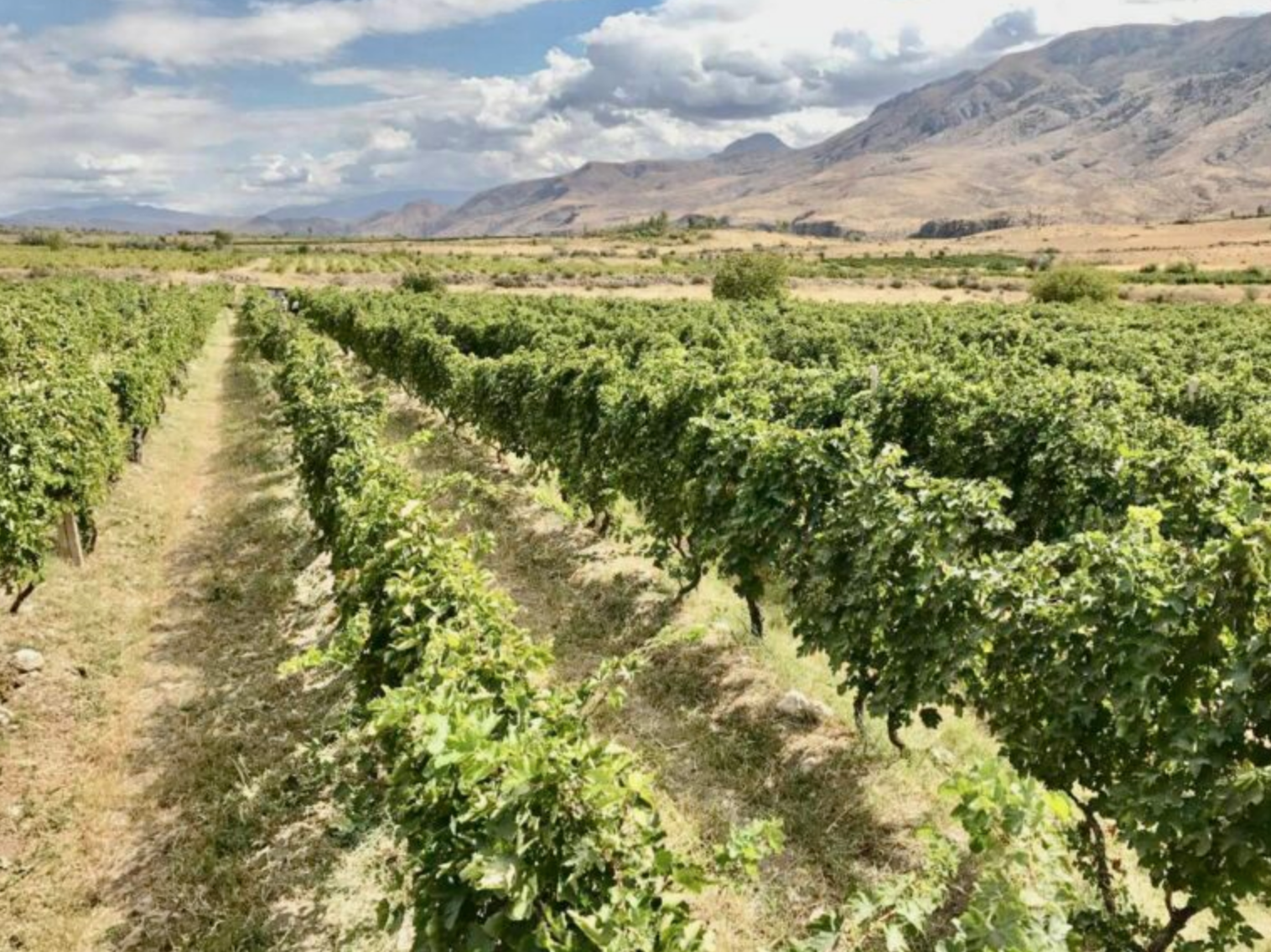The Gevorkian winery founded by Vahagn Gevorkian in 2006 is both an innovator and promoter of Armenia's rich winemaking tradition. The winery started out by embracing a historically important part of Armenian culture celebrating the pomegranate, one of the important spiritual symbols of Armenia. Gevorkian’s pomegranate wine is sold in unique fruit shaped bottles and sold internationally to many countries from the USA to Lebanon.
Gevorkian is also a major advocate of the ancient Armenian Kakhani methodology for producing wines from dried grapes. The wines produced are similar to the Amarone wines of northern Italy. Gevorkian is also a great proponent of the use of karas, the Armenian term for clay amphora, rescuing and restoring many old amphora from villages all over Armenia.
Recently Gevorkian made the first pét-nat to come out of Armenia, made from Areni grapes grown in the historically important Vayots Dzor region. It is interesting that such a new style of wine for modern Armenia comes out of a region that boasts the oldest example of systematic winemaking in the world at the archeological site of the Areni-1 cave, where carbon dating has established winemaking at scale going back 6,100 years.
As Armenia continues to emerge as a prominent player in the global wine industry, Gevorkian Winery stands at the forefront, bridging the gap between past and present, tradition and innovation.
Grape Collective talks to Vahagn Gevorkian about his wine journey and the future of Armenian wine.
Christopher Barnes: Vahagn, tell us how you first started your winery.
 Vahagn Gevorkian: I started in 2006. First I started by designing a bottle in the shape of a pomegranate, and then I wanted to sell this bottle. I started to produce a pomegranate wine. And, pomegranate wine is a very traditional wine in Armenia. It started before Christianity when the Armenian people had the pagan religion and the pomegranate is a symbol of pagan religion. In that old time, in our pagan monastery, the people made some religious rituals with pomegranate wine.
Vahagn Gevorkian: I started in 2006. First I started by designing a bottle in the shape of a pomegranate, and then I wanted to sell this bottle. I started to produce a pomegranate wine. And, pomegranate wine is a very traditional wine in Armenia. It started before Christianity when the Armenian people had the pagan religion and the pomegranate is a symbol of pagan religion. In that old time, in our pagan monastery, the people made some religious rituals with pomegranate wine.
(Vahagn Gevorkian)
After that, when Christianity came to Armenia, like 300 years later, the government said, “Don't make the pomegranate wine,” in order to forget the symbols of the pagan religion. Right now half of all wine exports from Armenia is pomegranate wine. It is very traditional for Armenia and many wineries make pomegranate wines. Different wineries use different technologies but the main thing is that it is a pomegranate alcohol product. It is very popular and it has a very great future, I think.
After the pomegranate wine, in 2008, I went to Italy, to the region of Treviso. It was a group trip for Armenian winemakers, so we were 11 winemakers, and we saw the winemaking in Treviso. We saw many wines such as prosecco. We were in Valpolicella, and I saw wines made from dried grapes and after that I remember that in Armenia we also have a very old tradition of hanging the grapes for drying.
People in Armenia dry not only the grapes but the fruits also. They want to keep the fruits for wintertime, to eat in wintertime. And some people make the wine from these dried grapes and call it kakhani. In English it's called honey wine. And in our villages, it's the sweet wine. and I take this kakhani method and make some changes and make some differences and now we make three types of wine from dried grapes.
In international competitions and exhibitions, I see that we need to define a style of Armenian winemaking. I decided to find some type of ancient Armenian traditional methods and to show the world and the international market that the Armenian people also have important traditional winemaking styles. Armenia has this very old winemaking history, you know, the mythology of Noah. And then the scientific part with the Areni-1 cave. So you have a very old culture. And then there was a break with the Ottoman Empire and communism, which kind of disrupted the industry.
Talk a little bit about your thoughts about the Armenian wine industry moving forward.
I think that we will keep the old methods like amphora (karas). We will base our winemaking on old methods and we will also create some modern things, but based on old methods.The history of Armenian winemaking is a very old heritage, and we want to keep this old heritage. I want to base the winemaking on these old methods but create new ways, create new thinking, new methods, but based on old methods.
And you've made the first pèt-nat in Armenia.
 It happened when I produced the rosé wines. I started rosé wines in 2011. When I produced rosé wine from the Areni variety, I looked during the fermentation process, and the wine had a very good aroma, it had a very good taste. Good color. The rosé was a little milky pink. And I was thinking about how to stop this moment and put this moment into the bottle. After that I read and I found that we have a word for this style of wine, they are the method ancestral, the method of pétillant naturel.
It happened when I produced the rosé wines. I started rosé wines in 2011. When I produced rosé wine from the Areni variety, I looked during the fermentation process, and the wine had a very good aroma, it had a very good taste. Good color. The rosé was a little milky pink. And I was thinking about how to stop this moment and put this moment into the bottle. After that I read and I found that we have a word for this style of wine, they are the method ancestral, the method of pétillant naturel.
I decided to make the pèt-nat from Areni and I think it's good. It's successful. And, many people say that it's very nice. It's very fresh, very aromatic and from the Areni grape variety very unique.
Talk a little bit about your use of the karas.
When I was young, I saw the first karas in my grandfather's house. I saw how we made the wine in these karases. And after that, how he made the grappa from this wine.
I want to say that from a young age, I saw the karas. And when I started to make the wine, the idea was to make the wine with the old method, of course. It is very creative for us because people want to see something old, something unique. They want to see something traditional, and winemaking in karas is, I think, very traditional for us. And that's why now I buy the karas from our villages.
I find it, and after that I buy it, I clean it because every karas is very dirty. Then we use it to make the fermentation, and after that we do the aging. It depends on what I want to make. Some winemakers say that karas give some taste, but I don't agree with them because my work history tells me that karas give only the micro-oxidation and not taste.
And karas gives the philosophy. What is the philosophy of karas? in the old time, the people said that it was like the shape of the mother's uterus, and wine feels in the karas as the child feels in mothers uterus.
Let's talk a bit about your approach and natural wine.
Well, the natural wine philosophy, I think that it is not only very modern for our time. I think that it is the future of winemaking. The professional winemakers, I think, should create wine only with natural things, very healthy, and with very good quality. And I think that it is the future and we have to go this way because we don't have any other ways. I have headaches when I feel SO2. So when I smell SO2 it's very, very bad, the worst for me. And so if something for my body is very bad I will make the wine without it.
Talk a little bit about your winemaking approach in terms of the sulfur usage and the karases, carbonic and orange wines.
 With this naturalist way I try to make some different wines. I first tried to make orange wine, four years ago, without SO2, with only natural ingredients. Now we make carbonic maceration wine, we make pèt-nat. I think of some different methods, but the main thing is I don't use sulfates and don't use any other things. And, to make something excellent, but with a method of naturalism. I think that is my goal.
With this naturalist way I try to make some different wines. I first tried to make orange wine, four years ago, without SO2, with only natural ingredients. Now we make carbonic maceration wine, we make pèt-nat. I think of some different methods, but the main thing is I don't use sulfates and don't use any other things. And, to make something excellent, but with a method of naturalism. I think that is my goal.
In the future, and I want to say in Vayots Dzor, I want to say that it is for me, the best terroir of Armenia, because the weather is mild and the earth is very good and everything is perfect for grapes. In the Vayots Dzor region I have a small vineyard and in this vineyard I want to build a new winery where I want to use only natural things. I don't want to use stainless steel and I don’t want to use rubber. I want to make a gravity winery with amphoras and with everything natural.
So my last question is, tell us what your hopes are for the future of wine in Armenia.
I think that the geopolitical part of Armenia is in that place where we have to make only unique wine, because we don't have a huge quantity of grapes and we can’t be an industrial winemaking country. We can only showcase the unique wines with all traditions and to show the world only the uniqueness of the Armenian place.














